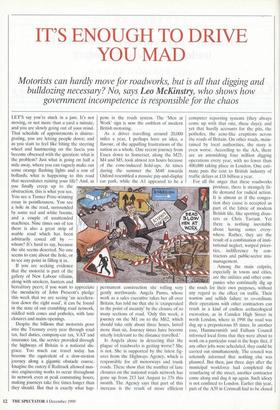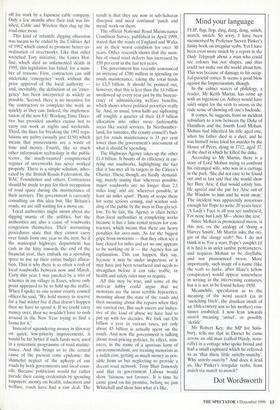IT'S ENOUGH TO DRIVE YOU MAD
Motorists can hardly move for roadworks, but is all that digging and bulldozing necessary? No, says Leo McKinstry, who shows how government incompetence is responsible for the chaos
If you are seeking evidence that the motorist is part of the gallery of New Labour villains, along with smokers, hunters and hereditary peers; if you want to appreciate the mendacity of John Prescott s pledge this week that we are seeing 'an accelera- tion down the right road', it can be found in the state of our crumbling road network, riddled with cones and potholes, with lane closures and mains openings.
Despite the billions that motorists pour into the Treasury every year through road tax, fuel duties, company-car tax, VAT and insurance tax, the service provided through the highways of Britain is a national dis- grace. Too much car travel today has become the equivalent of a slow-motion journey along a gigantic obstacle course. Imagine the outcry if Railtrack allowed mas- sive engineering works to occur throughout its network even at peak commuting hours, making journeys take five times longer than they should. But that is exactly what hap- pens in the roads system. The 'Men at Work' sign is now the emblem of modern British motoring.
As a driver travelling around 20,000 miles a year, I perhaps have an idea, a flavour, of the appalling frustrations of the nation as a whole. One recent journey from Essex down to Somerset, along the M25, M4 and M5, took almost ten hours because of the cone-induced hold-ups. At times during the summer the M40 towards Oxford resembled a massive pay-and-display car park, while the Al appeared to be a
permanent construction site rolling very gently northwards. Angela Pumo, whose work as a sales executive takes her all over Britain, has told me that she is 'exasperated to the point of insanity' by the closure of so many sections of road. 'Only this week, a journey on the Ml on to the M62, which should take only about three hours, lasted more than six. Journey times have become utterly irrelevant to the distance travelled.'
Is Angela alone in detecting that the plague of roadworks is getting worse? She is not. She is supported by the latest fig- ures from the Highways Agency, which is responsible for all motorways and trunk roads. These show that the number of lane closures on the national roads network has gone up from 213 last August to 376 this month. The Agency says that part of this increase is the result of more efficient computer reporting systems (they always come up with that one, these days); and yet that hardly accounts for the pits, the potholes, the acne-like eruptions across the roads of Britain. On other roads, main- tained by local authorities, the story is even worse. According to the AA, there are an astonishing four million digging operations every year, with no fewer than 400,000 taking place in London. One esti- mate puts the cost to British industry of traffic delays at £18 billion a year.
For all the anger that these roadworks produce, there is strangely lit- tle demand for radical action. It is almost as if the conges- tion they cause is accepted as part of the fabric of modern British life, like sporting disas- ters or Chris Tarrant. Yet there is nothing inevitable about having cones every- where. Rather, they are the result of a combination of insti- tutional neglect, warped priori- ties, indifference by con- tractors and public-sector mis- management.
Among the main culprits, especially in towns and cities, are the utilities and other com- panies who continually dig up the roads for their own purposes, without any regard to the effect on traffic. Their wanton and selfish failure to co-ordinate their operations with other contractors can result in a kind of endless archaeological excavation, as in Camden High Street in north London, where in 1998 the road was dug up a preposterous 85 times. In another case, Hammersmith and Fulham Council informed local firms that they were about to work on a particular road in the hope that, if any other jobs were scheduled, they could be carried out simultaneously. The council was solemnly informed that nothing else was planned. But then, just three days after the municipal workforce had completed the resurfacing of the street, another contractor came along and dug it up again. Such idiocy is not confined to London. Earlier this year, part of the A39 in Cornwall had to be closed off for work by a Japanese cable company. Only a few months after their task was fin- ished, Cable and Wireless then dug up the road once more.
This kind of infantile digging obsession was meant to be ended by the Utilities Act of 1992 which aimed to promote better co- ordination of streetworks. Like that other wretched Tory initiative, the Cones Hot- line, which died an unlamented death in 1995, this legislation has failed, for a num- ber of reasons. First, contractors can still undertake 'emergency' work without the prior approval of the local authority and, inevitably, the definition of an 'emer- gency' has been interpreted as widely as possible. Second, there is no incentive for the contractors to complete the work as quickly as they can. Indeed, the implemen- tation of the new EU Working Time Direc- tive has provided another excuse not to carry out work at nights and weekends. Third, the fines for breaking the 1992 regu- lations are paltry (usually just £150) which means that prosecutions are a waste of time and money. Fourth, like so much other information technology in the public sector, the much-vaunted computerised register of streetworks has never worked properly. There is a simple solution, advo- cated by the British Roads Federation, the RAC Foundation and others. Contractors should be made to pay for their occupation of road space during the maintenance of their services. The government is currently consulting on this idea hut, like Britain's roads, we are still waiting for a move on.
Local authorities might moan about the digging mania of the utilities, but the authorities are also a cause of roadworks congestion themselves. Their accounting procedures state that they cannot carry over funds from one year to the next, So if the municipal highways department has cash in the kitty towards the end of the financial year, they embark on a spending spree to use up their entire budget alloca- tion. That is why there is so often a rash of local roadworks between now and March. Early this year I was puzzled by a trio of schemes in my village in Essex, whose only point appeared to be to hold up the traffic. When I spoke to one senior county council officer he said, 'We hold money in reserve for a bad winter but if that doesn't happen then we have to spend it. If we could carry money over, then we wouldn't have to rush around in the New Year trying to find a home for it.'
Instead of squandering money in this way on quick, low-priority improvements, it would be far better if such funds were used in a systematic programme of road mainte- nance. And this brings us to the central cause of the present cone epidemic: the shameful neglect of the upkeep of our roads by both governments and local coun- cils. Because politicians would far rather parade their caring credentials by spending taxpayers' money on health, education and welfare, roads have had a raw deal. The result is that they are now in sub-Saharan disrepair and need continual 'patch and mend' work on them.
The official National Road Maintenance Condition Survey, published in April 1999, stated that the roads of England and Wales are in their worst condition for over 30 years. Other research shows that the num- ber of visual road defects has increased by 150 per cent in the last ten years.
The government has recently announced an increase of £700 million in spending on roads maintenance, taking the total funds to £3.3 billion. It should be pointed out, however, that this is less than the £4 billion swallowed up every year just by the bureau- cracy of administering welfare benefits, which shows where political priorities really lie. And, as usual, town halls are siphoning off roughly a quarter of their £1.9 billion allocation into other more fashionable areas like social services. In Northumber- land, for instance, the county council's bud- get for roads maintenance is 35 per cent lower than the government's assessment of what it should be spending.
The Highways Agency takes up the other £1.4 billion. It boasts of its efficiency in car- rying out roadworks, highlighting the fact that it has met all its targets in the Citizen's Charter. These, though, are hardly demand- ing, merely stating that 'wherever possible, major roadworks are no longer than 2.5 miles long' and are 'wherever possible, at least six miles apart'. Plenty of scope there for some serious coning, and wanton sod- ding of the public by the men in Day-glo yel- low. To be fair, the Agency is often better than local authorities at completing works because it has a lane-rental system for con- tractors, which means that there are heavy penalties for over-runs. As for the biggest gripe from motorists — that they often see a lane closed for miles and yet no one appears to be working on it — the Agency has an explanation. This can happen, they say, because it may be under inspection; or it may have just been resurfaced and needs to strengthen before it can take traffic; or health and safety rules may so require.
All this may be true, and some of the anti-car lobby could argue that we motorists are the most terrible hypocrites, moaning about the state of the roads and then moaning about the repairs when they are carried out. But such sneers are indica- tive of the kind of abuse we have had to put up with for decades. We fork out £36 billion a year in various taxes, yet only about £5 billion is actually spent on the roads. And now the government is talking about road-pricing policies. In effect, min- isters, in the name of a spurious form of environmentalism, are treating motorists as a mirth cow, getting as much money as pos- sible from us but neglecting to provide a decent road network. Tony Blair famously said that in government Labour would show 'fairness, not favours'. It is time he came good on his promise, before we jam Whitehall and show him what it's like.



















































































 Previous page
Previous page